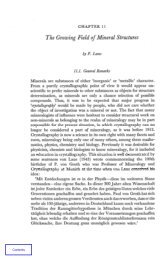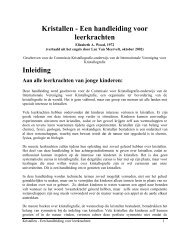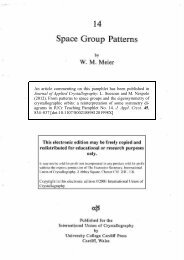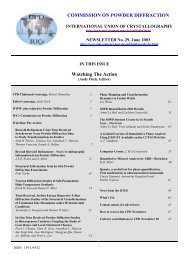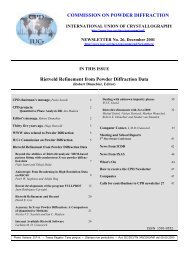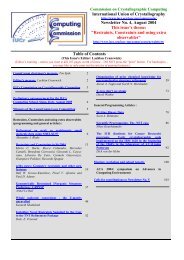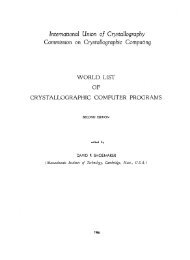- Page 1 and 2: Commission on Crystallographic Comp
- Page 3 and 4: CompComm Chairman’s Message This
- Page 5 and 6: Participants of the IUCr Computing
- Page 7 and 8: Direct Methods Meetings • Many pa
- Page 9 and 10: Problem from Symbolic Addition Meth
- Page 11 and 12: Thanks to our Sponsors ! • Bruker
- Page 13 and 14: Porting Existing Software Used to b
- Page 15 and 16: Command-line interfaces - old-fashi
- Page 17 and 18: Don’t re-invent the wheel unneces
- Page 19: Evolution of programming languages
- Page 23 and 24: Louis Farrugia - IUCr Computing Sch
- Page 25 and 26: Louis Farrugia - IUCr Computing Sch
- Page 27 and 28: Louis Farrugia - IUCr Computing Sch
- Page 29 and 30: Louis Farrugia - IUCr Computing Sch
- Page 31 and 32: Vector operations • Computer Scie
- Page 33 and 34: 6. Finding solutions to singulariti
- Page 35 and 36: Obsolete Legacy Code Re-inventing t
- Page 37 and 38: Uses of Legacy Code - Design Wider
- Page 39 and 40: Uses of Legacy Code Data Representa
- Page 41 and 42: Uses of Legacy Code - Design Singul
- Page 43 and 44: Matrix of Constraint ‘Riding’ a
- Page 45 and 46: Learning from the Past Learning fro
- Page 47 and 48: Outline Complete rewrites When, why
- Page 49 and 50: Example: d*TREK • User interface
- Page 51 and 52: One last thing … “Remember, sof
- Page 53 and 54: Coordinate Systems: Real space Frac
- Page 55 and 56: Coordinate Systems: Real space Othe
- Page 57 and 58: Coordinate Systems: Operators Rotat
- Page 59 and 60: Coordinate Systems Summary: In c
- Page 61 and 62: Map probability phasing: Getting a
- Page 63 and 64: Image enhancement using local featu
- Page 65 and 66: Iterative model-building and refine
- Page 67 and 68: Louis Farrugia - IUCr Computing Sch
- Page 69 and 70: Louis Farrugia - IUCr Computing Sch
- Page 71 and 72:
1 general introduction to suites Pr
- Page 73 and 74:
CCP4 runs on all commonly used plat
- Page 75 and 76:
Basic CCP4 directory hierarchy $CCP
- Page 77 and 78:
Pros & cons of scripting Pros • E
- Page 79 and 80:
Multi-step processes are toughwithG
- Page 81 and 82:
Even worse Even worse Even worse Co
- Page 83 and 84:
Page.5 © 2005 Bruker AXS BV. All R
- Page 85 and 86:
Page.13 © 2005 Bruker AXS BV. All
- Page 87 and 88:
Page.21 © 2005 Bruker AXS BV. All
- Page 89 and 90:
Page.29 © 2005 Bruker AXS BV. All
- Page 91 and 92:
Page.37 © 2005 Bruker AXS BV. All
- Page 93 and 94:
Page.45 © 2005 Bruker AXS BV. All
- Page 95 and 96:
Page.1 © 2005 Bruker AXS BV. All R
- Page 97 and 98:
Page.9 © 2005 Bruker AXS BV. All R
- Page 99 and 100:
Page.17 © 2005 Bruker AXS BV. All
- Page 101 and 102:
Stanton, et al. (1992) J. Appl. Cry
- Page 103 and 104:
Refine (crystal mosaicity) Refine (
- Page 105 and 106:
Integrate - Profile fitting Integra
- Page 107 and 108:
Goals of the Talk Atomic pair distr
- Page 109 and 110:
MI(T) transition is polaronic local
- Page 111 and 112:
History Disordered Carbon Warren, B
- Page 113 and 114:
Applications are networks of compon
- Page 115 and 116:
Useful book http://nirt.pa.msu.edu/
- Page 117 and 118:
Proteins and powders Proteins and p
- Page 119 and 120:
Comparing paracetamol trihydrate st
- Page 121 and 122:
Complex anisotropic sample line-sha
- Page 123 and 124:
Input Files Input files are: 1. A p
- Page 125 and 126:
DEFINE SOLVENT ACCESSIBLE VOID DEFI
- Page 127 and 128:
Ideas behind the Algorithm Possible
- Page 129 and 130:
Simple algorithms for macromolecula
- Page 131 and 132:
Density modification The heavy atom
- Page 133 and 134:
Automation of structure determinati
- Page 135 and 136:
Evaluating electron density maps Me
- Page 137 and 138:
Chain extension by placement of tri
- Page 139 and 140:
Automation of structure determinati
- Page 141 and 142:
Crystallographic symmetry: Space gr
- Page 143 and 144:
Crystallographic symmetry: Maps Map
- Page 145 and 146:
Crystallographic symmetry: hkl Reci
- Page 147 and 148:
Profile refinement Least-squares an
- Page 149 and 150:
What’s gone wrong? • We’ve pe
- Page 151 and 152:
Part III What if there’s an impur
- Page 153 and 154:
20% Y 2 O 3 : robust refinement 100
- Page 155 and 156:
with thanks … M Brunelli, A N Fit
- Page 157 and 158:
Page 157
- Page 159 and 160:
Page 159
- Page 161 and 162:
Understanding Likelihood Example:
- Page 163 and 164:
Understanding Likelihood Understand
- Page 165 and 166:
Likelihood and Crystallography But
- Page 167 and 168:
Page 167
- Page 169 and 170:
A more complicated example of the s
- Page 171 and 172:
Refinement and Rebuilding On Minimi
- Page 173 and 174:
Difficulties in Maximum Likelihood
- Page 175 and 176:
Who’s Got What? Full matrix refi
- Page 177 and 178:
I y I ( T T ) b ci h i h i {h}
- Page 179 and 180:
Needs for precise refinements and m
- Page 181 and 182:
Skeleton of the Rietveld algorithm
- Page 183 and 184:
Introduction Statistical Treatment
- Page 185 and 186:
Maximum Likelihood Finding the mos
- Page 187 and 188:
Talk Outline Programming pdCIF and
- Page 189 and 190:
CIF Dictionaries CIF definitions ar
- Page 191 and 192:
GSAS2CIF: Solutions • Divide Acta
- Page 193 and 194:
Specify plot contents Page 193
- Page 195 and 196:
Intra-Molecular (Continued) • Det
- Page 197 and 198:
“Orthorhombic” Polymorph Tetrag
- Page 199 and 200:
Validation with PLATON - Details: w
- Page 201 and 202:
Consult the CSD • It is a good id
- Page 203 and 204:
You may want an identical result if
- Page 205 and 206:
Profiling: use an external program
- Page 207 and 208:
The Multan Era (1969-1986) The prog
- Page 209 and 210:
Disulfide bond resolution When the
- Page 211 and 212:
Clipper libraries Clipper libraries
- Page 213 and 214:
Clipper Libraries: In detail Crysta
- Page 215 and 216:
Clipper libraries Data objects: Re
- Page 217 and 218:
Clipper libraries Data objects: I
- Page 219 and 220:
Clipper libraries Expanding data to
- Page 221 and 222:
Map manipulation Skeletonisation:
- Page 223 and 224:
Map manipulation Skeletonisation: M
- Page 225 and 226:
The hidden trap If the floating poi
- Page 227 and 228:
Equivalents in P4 1 2 1 2 For P4 1
- Page 229 and 230:
D:\tmp\gs_tutorial_code\gsm_data_an
- Page 231 and 232:
D:\tmp\gs_tutorial_code\gsm_data_an
- Page 233 and 234:
D:\tmp\gs_tutorial_code\tim_gruene_
- Page 235 and 236:
D:\tmp\gs_tutorial_code\tim_gruene_
- Page 237 and 238:
D:\tmp\gs_tutorial_code\tim_gruene_
- Page 239 and 240:
D:\tmp\gs_tutorial_code\michel_fodj
- Page 241 and 242:
D:\tmp\gs_tutorial_code\michel_fodj
- Page 243 and 244:
D:\tmp\gs_tutorial_code\michel_fodj
- Page 245 and 246:
D:\tmp\gs_tutorial_code\michel_fodj
- Page 247 and 248:
D:\tmp\gs_tutorial_code\juan_rc_f95
- Page 249 and 250:
D:\tmp\gs_tutorial_code\juan_rc_f95
- Page 251 and 252:
D:\tmp\gs_tutorial_code\juan_rc_f95
- Page 253 and 254:
package reflectionSort; import java
- Page 255 and 256:
private void setIfStandardHkl(Mille
- Page 257 and 258:
package reflectionSort; import java
- Page 259 and 260:
package reflectionSort; import java
- Page 261 and 262:
D:\tmp\gs_tutorial_code\stephan_rue
- Page 263 and 264:
D:\tmp\gs_tutorial_code\stephan_rue
- Page 265 and 266:
D:\tmp\gs_tutorial_code\stephan_rue
- Page 267 and 268:
D:\tmp\gs_tutorial_code\stephan_rue
- Page 269 and 270:
D:\tmp\gs_tutorial_code\ralf_gk_pyt
- Page 271 and 272:
CrysFML: A crystallographic library
- Page 273 and 274:
Scope of CrysFML We have developed
- Page 275 and 276:
Example of BasIreps output: *.bsr +
- Page 277 and 278:
Output of the small program: Get_SP
- Page 279 and 280:
Installing and compiling CrysFML us
- Page 281 and 282:
Socket programming To complete this
- Page 283 and 284:
} char protocol[2]; char s_status[6
- Page 285 and 286:
mess = recvfixed(s, length) except
- Page 287 and 288:
looping foreach var {1 2 3 a b c} {
- Page 289 and 290:
• Nothing happens! Demo 4 - New c
- Page 291 and 292:
Unix/OS X proc forknewterm {title c
- Page 293 and 294:
Here two steps are combined into on
- Page 295 and 296:
we don't have to invent names for t
- Page 297 and 298:
Computation of the least-squares re
- Page 299 and 300:
class refinery: def __init__(self):
- Page 301 and 302:
Exercise (not very hard) Read the 2
- Page 303 and 304:
direct_methods_light.py Overview Th
- Page 305 and 306:
If the miller_array is an intensity
- Page 307 and 308:
print "number of large_e_values:",
- Page 309 and 310:
technical detail. A subsequent step
- Page 311 and 312:
xray_structure = acta_c.cif_as_xray
- Page 313 and 314:
correlation = flex.linear_correlati
- Page 315 and 316:
At this stage the peak_model object
- Page 317 and 318:
Central cctbx types unit_cell compo
- Page 319 and 320:
Running AutoSol in PHENIX to phase
- Page 321 and 322:
Now reconsider what we are doing...
- Page 323:
Call for Contributions to the Next




